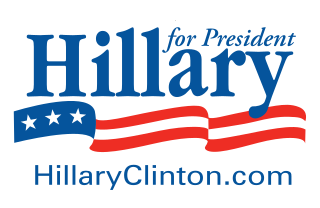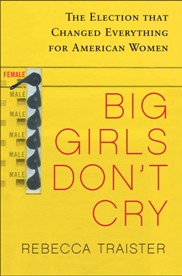
Maureen Brigid Dowd is an American columnist for The New York Times and an author.

EMILY's List is an American political action committee (PAC) that aims to help elect Democratic female candidates in favor of abortion rights to office. It was founded by Ellen Malcolm in 1985. The group's name is an acronym for "Early Money Is Like Yeast". Malcolm commented that "it makes the dough rise". The saying is a reference to a convention of political fundraising: that receiving many donations early in a race helps to attract subsequent donors. EMILY's List bundles contributions to the campaigns of Democratic women in favor of abortion rights running in targeted races.

Donna Lease Brazile is an American political strategist, campaign manager and political analyst who served twice as acting Chair of the Democratic National Committee (DNC). She is currently an ABC News contributor, and was previously a Fox News contributor until her resignation in May 2021. Brazile was also previously a CNN contributor, but resigned in October 2016, after WikiLeaks revealed that she shared two debate questions with Hillary Clinton's campaign during the 2016 United States presidential election.
Hardball with Chris Matthews is an American television talk show that was hosted by Chris Matthews. The program premiered on the now-defunct America's Talking network in 1994 before moving on CNBC, and then to MSNBC, where it remained until its cancellation in 2020. The show took its name from Matthews' 1988 book: Hardball: How Politics Is Played Told by One Who Knows the Game. The program primarily featured coverage of political issues and headlines, along with discussion from a panel of analysts and political figures.

Michelle LaVaughn Robinson Obama is an American attorney and author who served as the first lady of the United States from 2009 to 2017. She was the first African-American woman to serve in this position. She is the wife of former President Barack Obama.
This is a list of books and scholarly articles by and about Hillary Clinton, as well as columns by her.

Hillary Diane Rodham Clinton is an American politician, diplomat, lawyer, writer, and public speaker who served as the 67th United States secretary of state from 2009 to 2013, as a United States senator representing New York from 2001 to 2009, and as first lady of the United States from 1993 to 2001 as the wife of President Bill Clinton. A member of the Democratic Party, she was the party's nominee for president in the 2016 presidential election, becoming the first woman to win a presidential nomination by a major U.S. political party; Clinton won the popular vote, but lost the Electoral College vote, thereby losing the election to Donald Trump.

The 2008 presidential campaign of Hillary Rodham Clinton, then junior United States senator from New York, was announced on her website on January 20, 2007. Hillary Clinton was previously the First Lady of the United States and First Lady of Arkansas prior to her election as U.S. Senator from New York. She is also the wife of former President Bill Clinton. Clinton was the source of much media speculation since having expressed interest in being a candidate in the 2008 presidential election since at least October 2002.
Hillaryland was the self-designated name of a group of core advisors to Hillary Clinton, when she was First Lady of the United States and again when, as United States Senator, she was one of the Democratic Party candidates for President in the 2008 U.S. election.

"People United Means Action" was a political action committee in the United States that opposed the Democratic Party leadership and the nomination of Senator Barack Obama as the Democratic candidate for President in the 2008 presidential election. PUMA began as an effort by supporters of Obama's primary rival, Senator Hillary Rodham Clinton, who believed that Clinton should have been the Democratic nominee. According to PUMA, "We [were] protesting the 2008 Presidential election because we refuse to support a nominee who was selected by the leadership rather than elected by the voters."

Sarah Palin, while serving as Governor of Alaska, was nominated as the first female candidate of the Republican Party for Vice President of the United States. Following the nomination, her public image came under close media scrutiny, particularly regarding her religious perspective on public life, her socially conservative views, and a perceived lack of experience. Palin's experience in foreign and domestic politics came under criticism among conservatives as well as liberals following her nomination. A poll taken by Rasmussen Reports just after the Republican National Convention in the first week of September 2008 found that Palin was more popular than either Barack Obama or John McCain; however, this perception later reversed. At the same time, Palin became more popular among Republicans than McCain. A February 2010 ABC News/Washington Post poll showed 71% of Americans felt Palin lacked the qualifications necessary to be President of the United States.

Oprah Winfrey's endorsement of Senator Barack Obama was one of the most widely covered and studied developments of the 2008 presidential campaign, as she has been described as the most influential woman in the world. Winfrey first endorsed Senator Obama in September 2006 before he had even declared himself a candidate. In May 2007 Winfrey made her official endorsement of candidate Obama, and in December 2007, she made her first campaign appearances for him. Two economists estimate that Winfrey's endorsement was worth over a million votes in the Democratic primary race and that without it, Obama would have received fewer votes. Then-Governor of Illinois Rod Blagojevich claimed that the endorsement was so significant in making Obama president-elect that he considered offering Obama's former seat in the Senate to Winfrey.

The 2008 United States presidential election in South Carolina took place on November 4, 2008, and was part of the 2008 United States presidential election. Voters chose eight representatives, or electors to the Electoral College, who voted for president and vice president.

Game Change: Obama and the Clintons, McCain and Palin, and the Race of a Lifetime is a book by political journalists John Heilemann and Mark Halperin about the 2008 United States presidential election. Released on January 11, 2010, it was also published in the United Kingdom under the title Race of a Lifetime: How Obama Won the White House. The book is based on interviews with more than 300 people involved in the campaign. It discusses factors including Democratic Party presidential candidate John Edwards' extramarital affair, the relationship between Democratic presidential nominee Barack Obama and his vice presidential running mate Joe Biden, the failure of Republican Party candidate Rudy Giuliani's presidential campaign and Sarah Palin's vice presidential candidacy.
Women in conservatism in the United States have advocated for social, political, economic, and cultural conservative policies since anti-suffragism. Leading conservative women such as Phyllis Schlafly have expressed that women should embrace their privileged essential nature. This thread of belief can be traced through the anti-suffrage movement, the Red Scare, and the Reagan Era, and is still present in the 21st century, especially in several conservative women's organizations such as Concerned Women for America and the Independent Women's Forum.

Duchess Harris is an African-American academic, author, and legal scholar. She is a professor of American Studies at Macalester College in Saint Paul, Minnesota, specializing in feminism, Law of the United States, and African American political movements.
The 2016 presidential campaign of Hillary Clinton was announced in a YouTube video, on April 12, 2015. Hillary Clinton was the 67th United States Secretary of State and served during the first term of the Obama administration, 2009 to 2013. She was previously a United States Senator from New York, 2001 to 2009, and is the wife of former President Bill Clinton, serving as First Lady of the United States from 1993 to 2001.

Rebecca Traister is an American author and columnist. Traister is a writer-at-large for New York magazine and its website The Cut, and a contributing editor at Elle magazine. Traister wrote for The New Republic from February 2014 through June 2015. Traister regularly appears on cable TV news, commenting on feminism and politics.

The cultural and political image of Hillary Clinton has been explored since the early 1990s, when her husband Bill Clinton launched his presidential campaign, and has continued to draw broad public attention during her time as First Lady of the United States, U.S. Senator from New York, 67th United States Secretary of State, and the Democratic Party's nominee for President of the United States in the 2016 election.
The woman card is an idiomatic phrase that refers to exploitation of either sexist or pro-female attitudes by accusing others of sexism or misogyny. A person exploiting such attitudes is said to be playing the woman card, gender card.














